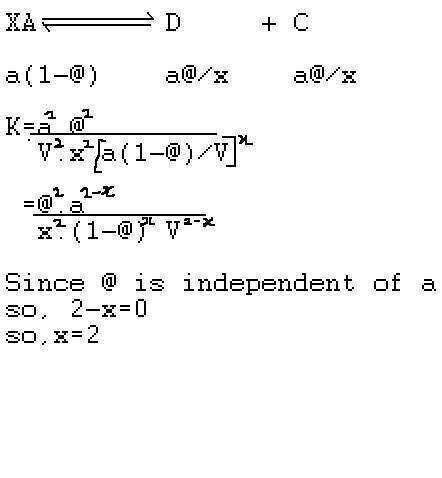Any idea any one!!
[7]
In a reaction at equilibrium x mole of reactant A decompose t ogive 1 mole of C and D.It was found that the fraction of A decomposed at eq is independent of conc. of A,then calculate X.
okkkkkkk.................both methods are equal..............thanx........and nishant sir plz pink the correct reply.....its difficult to figure out!!
u are unable to see the answer because it is 3 posts below the pinked soln...
I got x=2 but its a big guess...............some flaws may be present.....
don't go on my convention
take initial mole as y and the decomposed as x=yα
x mole of reactant A decompose t ogive 1 mole of C and D
â–‘â–’â–‘â–’â–‘â–’â–‘â–’â–‘â–’â–‘â–’â–‘â–’â–‘â–’â–‘â–’â–‘â–’â–‘â–’â–‘â–’â–‘â–’â–‘â–’
yes then it will be 2.. :)
But how i can know what is X... is it convention...
anyways... i solved one in chem again... [1]
â–‘â–’â–‘â–’â–‘â–’â–‘â–’â–‘â–’â–‘â–’â–‘â–’â–‘â–’â–‘â–’â–‘â–’â–‘â–’â–‘â–’â–‘â–’â–‘â–’
According to my understanding of the question
x is the initial mole
X=αx is the decomposed mole of A
so here X=xα is asked not x
A ≈ mC+mD
moles at t=o x 0 0
at eq. x(1-α) mxα mxα
where mxα=1
let volume be V
A ≈ mC+mD
at eq. x(1-α) mxα mxα
V V V
as mxα=1
c(1-α) 1/V 1/V
1/V=cmα
as mxα=1 and x/V=c
so...
Keq=(cmα)m(cmα)m
c(1-α)
K=c2m-1(mα)2m = K
(1-α)
for α to be independent of c...... 2m-1=0... m=1/2
then α=2K/K+1
or x=(1+2K)
K
not x=2 :(
and reaction is A ≈ (1/2)C+(1/2)D
or 2A ≈ C + D
Another answr x=1+2K/K
this time i'll post complete soln.. :)
in next post..
no.............x=2........surprised????????main bhi........par answer yahi hai.......bas solve nahin ho raha!!!!!!!